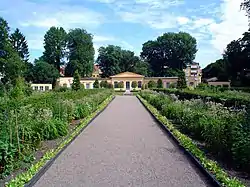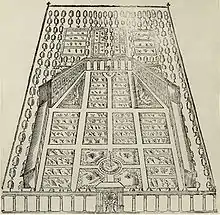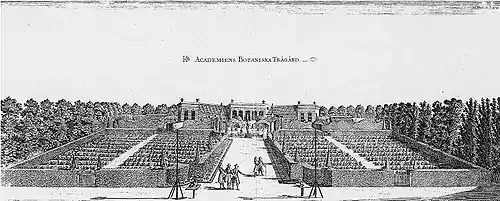Linnaean Garden
The Linnaean Garden or Linnaeus' Garden (Swedish: Linnéträdgården) is the oldest of the botanical gardens belonging to Uppsala University in Sweden. It has been restored and is kept as an 18th-century botanical garden, according to the specifications of Carl Linnaeus.


The garden was originally planned and planted by Olaus Rudbeck, professor of medicine, in 1655. Rudbeck also built the house adjacent to the garden. At the end of the 17th century it had about 1,800 different species, but was damaged in the Uppsala city fire 1702. Linnaeus became responsible for the garden in 1741 and had it rearranged according to his own ideas, documented in his work Hortus Upsaliensis (1748).[1]

After the gardens of Uppsala Castle had been donated to the university by King Gustav III to serve as a new botanical garden, the old one was left to decay. It was bought by the Swedish Linnaean Society in 1917 and restored according to the detailed description in the Hortus Upsaliensis. The garden was later taken over by the university, while the Linnaean Museum in the house in which Linnaeus had his home is still run by the Society. It is now one of two satellite gardens of the larger University of Uppsala Botanic Garden near Uppsala Castle. The second satellite is Linnaeus Hammarby, the former summer home of Linnaeus and his family.[2]
References
- "Botanical Garden History". Uppsala University. Archived from the original on 8 June 2011. Retrieved 28 June 2011.
- "University of Uppsala Botanic Garden". Botanic Gardens Conservation International. Retrieved 28 June 2011.
External links
 Media related to Linnaean Garden at Wikimedia Commons
Media related to Linnaean Garden at Wikimedia Commons Media related to Linnaean Museum at Wikimedia Commons
Media related to Linnaean Museum at Wikimedia Commons
